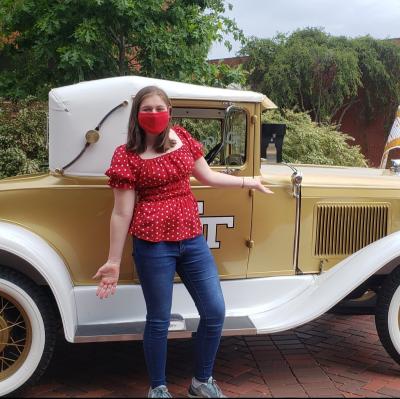Hometown: Columbus, Georgia
Favorite class: An INTA special topics course called Statecraft
Favorite professor: It’s too hard to choose!
Clubs: Ivan Allen College Student Advisory Board, Modern Languages Student Advisory Board, Georgia Tech Russian Club president, Georgia Tech Women’s Recruitment team member
Internships: Research with the Sustainable Megaregions Team, Research with Project Rubase, Volunteer ESL tutoring through Paper Airplanes, Intern U.S.-Ukraine Foundation
Most helpful resource in the School of Modern Languages: Honestly, the most helpful resources have always been my professors. They each care so much—on a deep, personal level—about their students that they really will go out of their way to help you, whether it is with extra practice, recommendations, advice, or study abroad coordination. I am so grateful for every faculty member in the Russian department.
1. Why did you choose to study your language track at Georgia Tech?
I always had a general interest in Russian history and culture, and I wanted to start a new language in college, so I started studying Russian in a casual way—thinking it would be a cool new thing to learn—without really considering how much it would (positively!) impact my studies and my life.
First starting to study Russian, I drastically underestimated the challenge of learning a new language, but I also found the study more rewarding than I’d dreamed. I met conversation partners outside of class through online language exchanges, local networks, and within my professor’s extended family—progressing lingually but also collecting narratives about life, perceptions of the US, values, and society. As a result, I took interest in Eastern European society, cultural politics, and U.S. ties. I’ve followed how American embassies promote cultural exchange and respond to conflict, studied post-Soviet development, and researched linguistic politics and democracy in Latvia, Belarus, and Ukraine.
These experiences connected me to a whole region of the world that I had only superficially understood in the past and helped me to learn a language as a medium of communication, rather than a collection of words. So, I would say I chose my language track based on a small interest, but I’ve chosen to stay in my language because of these deeper experiences that the language facilitated.
2. What inspired you to be a double major? How do you feel language skills complement your other area of study?
As the Russian language is so strongly tied to identity, land, shared histories, and political stratification, it serves as a key to understanding a whole group of peoples which all are very impactful in the world of international affairs. Moreover, the actual learning process of studying Russian has helped me to make major strides in active listening, patience, and tenacity.
3. What’s the coolest research/project/initiative/event you’ve worked on in Modern Languages?
During summer 2021, I helped to organize and conduct an interview in the Russian language with a former diplomat who represented Cuba in the Ukrainian SSR (the grandfather of one of our current students, actually). Hearing him talk about his experiences and getting to ask him questions was absolutely awesome.
4. How does a degree from Modern Languages contribute to your life plans?
Russian will no doubt help me in my future career, and it has already shaped the direction of my interests, areas of research, and hopes for study abroad.
5. What has been your biggest challenge at Georgia Tech, and how did you overcome it?
My greatest challenge at Georgia Tech was probably a combination of impostor syndrome and/or feeling like I’m not doing enough to measure up academically. In my first couple of years at Georgia Tech, I felt this very strongly, especially once Covid broke out, when all my study abroad plans fell though, and I really wondered if I was making the best (as society views it) use of my time. However, that time also taught me to focus on the things that I find truly important, and I think I’ve benefitted greatly from some amount of prioritization. And for that shift, I really must credit my friends and classmates—who both inspire and support me—and some of the perspectives I’ve gained through the volunteering I’ve done.
6. What is the biggest change you see in yourself now from when you started at Georgia Tech?
I think I’m a bit more grounded now. I have a better idea of how to contribute to a community, and my priorities and interests have shifted greatly.
7. What is your greatest achievement since coming to Georgia Tech?
I don’t appreciate one achievement in particular, but I think one of the most important things I’ve done is to get very involved with activities on campus to really feel like I fit into a community here.
8. What has been your favorite/most memorable moment in Modern Languages?
My most memorable single moment would be the interview I mentioned above. However, much more important and valuable than a single moment are the collections of interactions I’ve been able to have with native speakers and immigrants who have helped me to understand life in another place, using my target language as a medium of communication.
9. What advice would you give to incoming students in the School of Modern Languages?
Above all else, find a way to connect to your language outside of the classroom. Maybe that’s talking with family members. Maybe that’s watching films or listening to music. Maybe it’s finding a community of speakers with whom you can interact. Regardless, I’ve found that absolutely critical to both improving my language skills and maintaining my interest in the language I’m studying.

